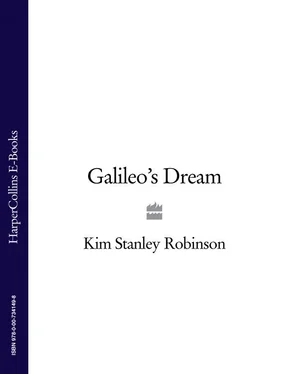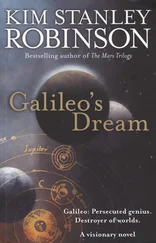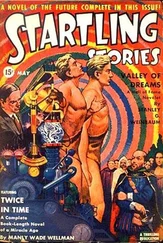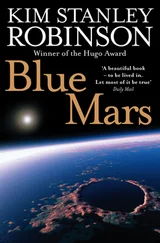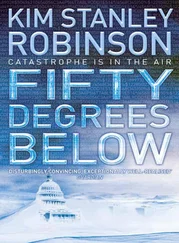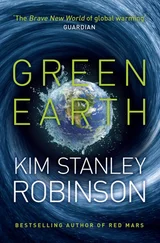Inside the vessel a few people huddled over banks of glass instruments and glowing squares of jewel colour. Their faces, lit from below by the glowing desk tops, looked monstrous. The livid glare of Jupiter seemed to leak out of their eyes.
Standing beside Galileo, Hera leaned over to speak in his ear; again her words came to him in a rustic Tuscan Italian, like something from Ruzante. ‘You understand that they’re using you?’
‘Not necessarily.’
‘Do you know where you are?’
‘This is one of the four moons orbiting Jupiter. I named them myself; they are called the Medicean Stars.’
Her smile was wicked. ‘That name didn’t stick. It’s only remembered now by historians, as a notorious example of science kissing the ass of power.’
Affronted, Galileo said, ‘It was nothing of the sort!’
She laughed at him. ‘Sorry, but from our perspective it’s all too obvious. And always was, I’m sure. You failed to consider that major planetary bodies are not best named for one’s political patrons.’
‘What do you call them, then?’
‘They are named Io, Europa, Ganymede and Callisto.’
‘Collectively,’ Ganymede interjected, ‘they are called the Galilean moons.’
‘Well!’ Galileo said, taken aback. For a moment he was at a loss. Then he said, ‘That’s a good name, I must admit.’ After a moment’s confusion he added, ‘Not greatly different than a name like Medici, if I am not mistaken—’ with a bold look at Hera.
She laughed again. ‘The discoverer of something is not the same as the discoverer’s patron. His hoped-for patron, to be precise. Making the name a gross bit of flattery, a kind of bribe.’
‘Well, I couldn’t very well name them for myself,’ Galileo pointed out. ‘So I had to choose something useful, did I not?’
She shook her head, unconvinced. But she had stopped laughing at him.
When he saw a chance, Galileo drifted over to her so they could speak sotto voce again. ‘You all speak as if I am someone from your past,’ he noted. ‘What do you mean?’
‘Your time is earlier than ours.’
Galileo struggled to comprehend this; he had been presuming that the stranger’s device had merely been transporting him across space. ‘What time is it here, then? What year?’
‘In your terms it is the year 3020.’
Galileo felt his mouth hanging open as he struggled to grasp this news. Transported not only to Europa, but to a time some fourteen hundred years after his own…Stunned, he said weakly, ‘That explains many things I did not understand.’
Her wicked smile again.
‘Of course it creates new mysteries as well,’ he added.
‘Indeed.’ She was looking at him with an expression he couldn’t read. She was not an angel, or an otherworldly creature, but a human like him. A very imposing woman.
There was a ping, a small jolt, and the room tilted to the side. Ganymede pointed to a white globe, lit from within, floating in the corner of the room. ‘A globe of Europa,’ he said to Galileo. He explained that its whites were faintly shaded to indicate the temperature of the surface; most of it was pale blue, crisscrossed by many faint green lines. Galileo crossed the room to look more closely at it, checking automatically for geometrical patterns in the surface craquelure. Triangles, parallelograms, spicules, radiola, pentagons…Where the lines intersected, the greens sometimes turned yellow, and in a few cases the yellow shifted to orange.
‘The tides break the ice,’ Ganymede explained, ‘and convective upwellings fill some of the cracks in the ice, forming vertical zones like artesian wells, that can serve as channels down to the liquid ocean. On Ganymede we called them flues.’
‘Tides?’ Galileo asked. ‘How can there be tides?’
All the Jovians stared at him. Hera shook her head briefly, as if the explanation would be beyond Galileo’s understanding. Irritated, he looked to Ganymede, who shrugged uncomfortably.
‘Gravity, you see…Perhaps we can discuss it another time. Because now we have begun our journey into the interior. We descend by melting the ice as we go, to clear the flue.’
The craft tilted first at one angle then another. A large rectangular patch on the chamber’s wall was filled with glowing primary colours, as if a rainbow had been used for paint. Ganymede informed him that their vessel was represented by the black pendant in the middle of this rectangle, and flowing upward past it were ribbons of rainbow colour, orange strands closest to the black blob, yellow and green twining around them. Off to one side, a larger rectangle was apparently a window, giving them a view of what passed outside; this consisted of nothing but a field of the darkest blue imaginable, a blue so deep and pure that it captured Galileo’s eye, and exhibited small reticulations and lighter gleams, revealing perhaps that it was an icy slush. It gave him much less information than the other rectangle, the brilliant colours indicating temperatures as he was informed they did.
Down, down, down some more. The blue outside the window flowed upward more swiftly, and darkened even more. The temperature ‘picture’ likewise flowed. Otherwise there was only the hum of the vessel’s machines, the brush of its air. Once Galileo had dreamed of falling off a ship and sinking into the Adriatic. Now they were all dreaming together.
Ganymede hated the necessity of this dive, hated the very idea of an intrusion into the ocean under the ice, and it soon became clear that his crew shared his opinion. They eyed their pictures with grim expressions, and said little; Ganymede strode back and forth nervously behind them, consulting with them in turn.
On the rainbow panel a green potato-shaped patch moved upward; it looked like a boulder. Galileo asked about it.
‘A meteorite,’ Ganymede replied. ‘Space is full of rocks. The shooting stars you see in your night sky are rocks, often as small as sand grains, burning very brightly.’
‘Friction with air is enough to ignite rock?’
‘They are moving really very fast. Here on Europa there is no atmosphere, however, so whatever it encounters crashes straight into the ice. It happens a lot, but impact craters in ice quickly deform and flow back toward flatness.’
‘No atmosphere? What about the air we were breathing up there?’
‘We live inside bubbles of air, held in place by forces or materials.’
Their vessel stopped in its descent; it was interesting to Galileo how clearly he could feel the halt, subtle though it was.
Ganymede said, ‘Pauline, is everything going well?’
‘All is well,’ said a woman’s voice, apparently from within the walls of the vessel.
‘How soon will it be before we reach the ocean?’
‘If we maintain this speed it will be thirty minutes.’
‘Is the Ariadne thread unspooling cleanly?’
‘Yes.’
Ganymede said to Galileo, ‘The Ariadne thread is also a heating element, and will keep the central line of our flue liquid, to ease our return.’
They waited, absorbed in their thoughts. The light downward pull of Europa made the crew’s movements around the bridge fluid and slow, like dance in a dream. Galileo found it hard to keep his balance, it was somewhat like floating in a river.
He drifted to Hera’s side and said, ‘All these machines have to work for us to stay alive.’
‘Yes, that’s right.’
‘It seems risky.’
‘It is. But because it is, we engineer for safety. Materials and power available are terrifically advanced compared to your time. And there is a principle called redundancy at the criticalities, do you know this term? Replacement systems are available in case of failures. Bad things still sometimes happen. But there you are. They do anywhere.’
Читать дальше
